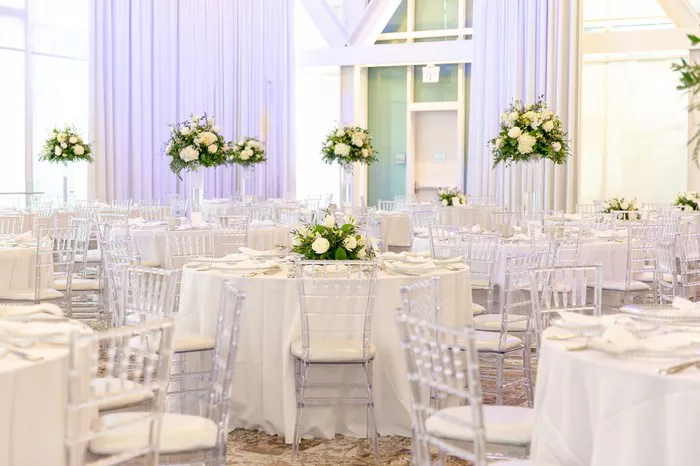Behind the romantic facades of wedding hotels lies a sophisticated business operation that has turned matrimonial celebrations into one of the hospitality industry’s most lucrative sectors. As the global wedding market balloons to an estimated $100 billion annually, luxury properties are developing increasingly creative strategies to capture more of this profitable pie—from revenue-maximizing package designs to year-round wedding infrastructure that requires minimal reconfiguration. The economics of wedding hotels reveal a fascinating intersection of romance and business acumen, where every floral arrangement and champagne toast is carefully calibrated for both emotional impact and financial return.
The financial anatomy of a successful wedding hotel begins with strategic space utilization. Properties like The Grand Harmony in California have pioneered the “wedding wheel” concept—a dedicated events wing designed for rapid turnover between ceremonies, receptions, and rehearsals. Their patented rotating dance floor system allows one area to be cleaned and reset while another is in use, enabling up to five weddings per day in peak season. “We’ve reduced changeover time from four hours to forty minutes through engineered workflows,” boasts GM Michael Torres. The hotel’s financials show remarkable efficiency: with average wedding packages starting at $75,000 and operating costs at just 32%, the events wing generates 58% of the property’s total revenue despite occupying only 20% of its square footage.
Pricing psychology plays a crucial role in wedding hotel profitability. Revenue managers have developed “tiered euphoria” pricing structures that gently guide couples toward higher spending. The Palms Resort in Miami offers three base packages—Bronze, Silver, and Gold—but their sales data shows 72% of couples ultimately customize beyond these options, spending an average of 28% more than initially budgeted. “The packages serve as psychological anchors rather than actual limits,” explains director of weddings Elena Rodriguez. Clever inclusions like “complimentary” champagne toasts (with built-in per-bottle upsell opportunities) and “free” suite upgrades (that increase guest room bookings) help boost overall spend. Their most effective tactic? Displaying the honeymoon suite during tours, which converts 83% of viewers into premium room bookers.
Food and beverage represents the biggest profit center, with margins often exceeding 70%. Wedding hotels have mastered the art of “perceived extravagance”—presentations that feel lavish while keeping food costs controlled. The Chateau Royale in France employs “visual abundance” techniques like towering seafood displays (with less expensive mussels forming the base) and passed hors d’oeuvres that look intricate but use economical ingredients creatively. Their beverage program generates particular profits through “signature cocktails” that utilize well liquor with premium garnishes, and wine pairing upgrades that cost the hotel $12 per bottle but sell for $85. “Guests remember the experience, not the pour cost,” sommelier Jean-Luc Bernard quips.
Ancillary revenue streams have become increasingly sophisticated. The Vista Hotels group has developed a remarkably profitable “vendor partnership” program where preferred photographers, florists, and musicians pay 15-20% commissions while gaining exclusive access to wedding clients. Their in-house bridal boutique generates $1,200 average revenue per wedding through last-minute accessory sales and emergency kits. Even the honeymoon has been monetized—their “Departure Concierge” books post-wedding travel at 30% margins while guests are still euphoric from the celebration.
Data analytics now drive wedding hotel operations to an unprecedented degree. The Luxe Alliance chain employs AI that predicts optimal pricing windows with 94% accuracy, adjusting package costs dynamically based on demand signals from social media searches and local event calendars. Their software can recommend the most profitable date for a couple’s desired budget six months in advance. “We know Tuesday weddings in February should be priced 22% lower than Saturday in June, but with specific upsell opportunities to maintain margins,” explains revenue tech officer Sanjay Patel.
The wedding hotel business model has proven remarkably resilient to economic downturns. While luxury travel typically suffers during recessions, high-end weddings maintain stable demand—couples simply adjust their guest counts rather than cancel entirely. The Sterling Properties group found that reducing average wedding size from 150 to 90 guests during the last recession only decreased revenue by 18%, as couples reallocated savings to premium upgrades. “People will always prioritize their wedding,” notes hospitality analyst Rebecca Cho. “Hotels that master this segment enjoy predictable cash flow even in volatile markets.”
Looking ahead, wedding hotels are investing in next-generation revenue opportunities. Some are developing wedding subscription models with annual anniversary packages, while others experiment with NFT wedding certificates that include lifetime hotel benefits. The emerging “micro-wedding” trend has led to clever space repurposing—hotels now market their underutilized executive lounges and rooftop terraces as intimate ceremony venues at premium per-head rates. As the marriage industry continues evolving, one truth remains constant: for savvy hoteliers, love isn’t just in the air—it’s on the balance sheet.


